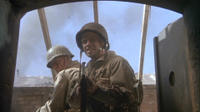 The Big Red One (1980)
The Big Red One (1980)I'm not usually a big fan of war films. They all seem to blend into one another after a while, for me. Like any genre, there are some great works that transcend their respective genres, though. And, even if not, there are some great films set in the overall genre, nonetheless. The Big Red One, from what I understand, has been sorely neglected since its release, subsequently cut and recut by studios. Finally, thanks to Warner and Fuller's good friend Richard Schickel, we can now experience something close to Fuller's original vision of this very personal film.
The Big Red One's main focus is the camaraderie that develops between fellow soldiers during the war. It's important for a war film to have a specific focus, since war is such a vast subject, no single work can even begin to describe all the aspects of it in any kind of coherent detail. But, the relationship between the men in the Big Red One is the heart of the film. Just as the men themselves get to know and become fond of one another, so does the audience. And, Lee Marvin is great, stone-faced as usual, playing the sergeant who, in not so many words, becomes the surrogate father to these four young men. It's never spoken, but it's very easy to see it in their relationships, the Sarge abides, watching over all of them, letting them learn from their own mistakes, but always protecting them.
A key moment in the film, in some ways, one that turns it on its ear, I've used as my still. Griff is securing the perimeter, as they say, and he opens a metal grate to find an enemy soldier prone, his rifle aimed out of the grate. The look on his face is one of madness, as he squeezes his trigger endlessly, yet has no ammo. Griff, further illustrating the brotherhood of soldierdom, recognizes this deranged action and mimics it continuously. Of course, his chamber is still full of bullets, but by now, he's too far gone to notice this. It's a brilliant, effecting scene that shows that a brotherhood develops between not only those fighting alongside one another, but those on opposite sides of a conflict.
0 Comments:
modium
- Rhode Island, United States
- My profile
Links
Other Nerds
Previous posts
Archives
- 2005-06-26
- 2005-07-03
- 2005-07-10
- 2005-07-17
- 2005-07-24
- 2005-07-31
- 2005-08-07
- 2005-08-14
- 2005-08-21
- 2005-08-28
- 2005-09-04
- 2005-09-11
- 2005-09-18
- 2005-09-25
- 2005-10-02
- 2005-10-09
- 2005-10-16
- 2005-10-23
- 2005-11-06
- 2005-11-27
- 2006-01-29
- 2006-03-26
- 2006-04-02
- 2006-04-09
- 2006-04-30
- 2006-05-07
- 2006-05-28
- 2006-06-25
- 2006-07-09
- 2006-07-23
- 2006-08-06
- 2006-08-27
- 2006-09-03
- 2006-09-10
- 2006-09-17
- 2006-10-08
- 2006-11-19
- 2006-11-26
- 2006-12-03
- 2007-02-25
- 2007-06-17
- 2008-05-11
- 2008-05-25
- 2008-06-01
- 2008-06-22

